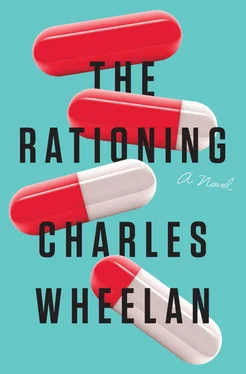“Yes, I got the briefing,” the Speaker said. “Aren’t we neglecting the real elephant in the room here?” she asked. The rest of us looked at her blankly until she continued. “The Health Research and Infrastructure Bill?”
“Just tell us what you’re talking about,” the Strategist said impatiently.
The Speaker continued, “That was the bill that outsourced our production of lifesaving drugs to private companies like Centera Biomedical Group.”
“Okay, that was a mistake, obviously,” the Strategist said. “But the horses aren’t just out of the barn on this one, they’re shitting up and down Main Street.”
The Speaker fixed her stare on the President. “You supported it.”
“Probably,” the President answered, throwing up his hands. “That was, what, eight years ago?”
“Seven.”
“Okay, what’s your point?” the President asked.
“We knew that bill was a bad idea at the time,” the Speaker said.
“Who’s ‘we’?” the President asked. We were five minutes into the meeting and he already sounded beleaguered.
“The progressive caucus,” she answered stonily.
The Strategist started to clap, slowly and loudly. “Cut it out,” the President snapped. He turned back to the Speaker. “Do you realize what we’re dealing with here?”
“Of course I do. I’m just saying that some part of our response must involve facing up to how we got here.”
“A government warehouse caught on fire in Long Beach,” the Chief of Staff said.
“And?” the Speaker prompted.
“We’ve already arrested the Centera executives,” the President said. “Obviously we can’t publicize that.”
“What about those of you who entrusted America’s health to a greedy pharmaceutical company?” she asked.
“Oh, for fuck sake,” the Strategist blurted out. This time the President did not cut him off. “Is there anything with you that is not political? Anything? ”
The President was calmer. Perhaps he had been bracing himself for this. He turned to the Chief of Staff and asked, “What’s the number?”
“We’re still waiting for the NIH data, so it hasn’t changed—”
“I know. What is it?”
The Chief of Staff opened up her laptop and looked at the screen. “Actually, several big Dormigen shipments have come in from Europe. One from Brazil.”
“What’s the number.” It was not really a question, the way he said it.
“Just over 1.3 million.”
The President turned back to the Speaker. “Do have any comprehension of what that means?” He spoke slowly. His voice was tinged with anger and disrespect.
“My understanding is that the Chinese have offered enough Dormigen to cover the gap,” she said.
“Yes, if we want to abdicate our foreign policy to them for the next fifty years,” the President replied with just a hint of sarcasm. “I don’t think that’s a very good idea.”
“You’re not going to let 1.3 million Americans die, I assume,” the Speaker replied confidently.
“That’s why we’re here!” the Chief of Staff yelled. “That’s what we’re doing right now. That’s why we’ve been meeting every day for hours on end. We’re looking for a way forward.” She grew calmer as she spoke, but I could see that her hands, still holding the laptop, were shaking slightly.
“Of course, I understand,” the Speaker said, offering up her best impression of sincerity. “Thank you for all your hard work on this.”
The President, provoked by the patronizing tone, shifted uncomfortably in his seat. “Can we just cut to the chase here? What is it you want?” he asked.
“This is not about me,” the Speaker said calmly. “Can’t you see what is happening here? The country is in the midst of what may become the worst crisis of the twenty-first century, and you have locked yourselves in this room, as if the rest of the government has no say in what’s happening.” She looked slowly around the room before continuing. “You cannot possibly think this is okay.”
The Chief of Staff said, “We have a tough balancing act. We are trying to deal with the situation without causing a panic.”
“Maybe you’ve convinced yourselves of that,” the Speaker said. “Here is what I see: A small group of people trying to cover up a crisis that the President and all the other corporate lapdogs in Congress set in motion. You put the health of the nation in the hands of a greedy pharmaceutical company, and now here we are.”
“Very nice,” the Strategist said. “Have you run that language by a focus group? I bet it tests very well.”
The President said, “Let me ask again, because time is really important here: What do you want? ” He enunciated each word in the question slowly and clearly.
“It’s not what I want, it’s what needs to happen. This is not about me,” the Speaker said, prompting smirks around the room. The Strategist laughed out loud. The Speaker turned to him and said sharply, “I’m not seeing the humor here.”
The President stared at the Speaker stonily, waiting for her to continue, which she eventually did. “Two things need to happen,” she said. “First, Congress needs to be involved. This is a matter of national importance. The people in this room should not be making these kinds of decisions alone. Also—”
The Secretary of Defense interrupted, “With all due respect, Madam Speaker, nothing that we’re discussing here falls within the purview of Congress. Health and Human Services manages the Dormigen stock. That’s an executive agency. The President has complete authority to negotiate with other governments. Congress has no authority over any of this.”
“You are completely missing the point,” the Speaker answered sharply. “Congress is the elected representative body of the American people.” She turned suddenly to look at the Strategist, who had begun humming “God Bless America.”
“Seriously?” the Speaker asked incredulously.
“Congress can’t paint a hallway in less than a month,” the Strategist said. “And five hundred and thirty-five people cannot possibly keep anything confidential. We are running out of Dormigen and a million people could die if we don’t figure out what the hell to do. One million people . We invited you here because we want and need your input. But there is no way that Congress can make these decisions. It’s just not realistic.”
“Congress needs to be meaningfully involved,” she said.
“I appreciate that,” the President offered noncommittally. “What was your second point?” I had long since forgotten that she had a second demand.
The Speaker continued: “When this situation is resolved, there has to be a public accounting of how we got here.”
“What does that mean exactly?” the Chief of Staff asked.
“It means that if we dodge a bullet here, as I fully expect we will, the American people need to know how close we came to complete disaster. And who was responsible, obviously.”
“I’m glad you think we’re going to dodge the bullet,” the President said.
“One phone call to Beijing and it’s all over,” the Speaker said.
“It’s that simple, is it?” the President asked facetiously.
“Okay, thank you, everyone,” the Chief of Staff said. “We’ll know more tomorrow when we get the NIH data. Thank you, Madam Speaker. We will take all this under advisement.”
As the participants filed out of the room, the Strategist pulled the President and the Chief of Staff aside. “We need to get our legal counsel on this,” he said.
“I know,” the President acknowledged. “And the National Security people, if there is any chance we may be doing some kind of deal with China.”
Читать дальше












